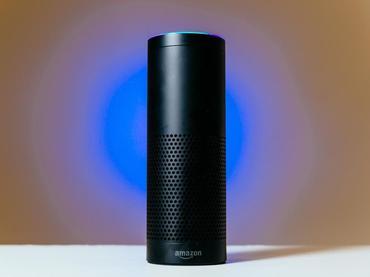Image: Radomir Rezny, Getty Images, iStock
In a first for the hotel industry, Wynn Las Vegas is taking a gamble with the Amazon Echo smart speaker and equipping 4,748 hotel rooms with the hands-free natural language processing device.
Wynn began deploying the devices in suites this month, and it will be available in all guest rooms by summer 2017. Guests will not be able to log into their own Amazon account to use Echo, but they will be able to control room features such as lighting and temperature, as well as opening and closing window drapes and turning on the TV by giving voice commands to Alexa, which is the name of Echo’s virtual voice assistant. Eventually, the plan is to add future features such as personal assistant functions, according to a Wynn spokesperson.
This will be the first time any hotel has provided Amazon Echo to all guests, according to Rajeev Kaul, managing director and Accenture technology lead for travel in North America.
SEE: Wynn Las Vegas installing an Amazon Echo in every hotel room (ZDNet)
Being able to have what amounts to hands-free concierge services is of particular interest to business travelers because they spend less time in a hotel room and they have less spare time than vacation travelers, Kaul said.
“Giving business travelers, particularly millennial business travelers, frictionless travel is key. It’s more important for business travelers than personal travelers to have friction removed from their travel, particularly their hotel stay,” Kaul said.
There has been growing interest in the hotel industry to use natural language processing (NLP) devices. For the past nine months, Accenture has been working with other hotel clients who are testing the devices internally before rolling them out to guests, Kaul said.
“There is a tremendous amount of interest among the hospitality industry not just in Alexa, but also in other natural language processing technologies. We’ve been working with prototypes for resorts and casinos similar to Wynn, so I wasn’t that surprised when I saw their announcement. I’d be more surprised if a larger chain said they were going to do that across their system, because the larger hotel chains, the Marriotts and the Hiltons, don’t typically own their hotels. They’re managed or franchised so it’s quite a step to say ‘Owner X, you need to invest and put this in every room.’ Casinos are typically owned and operated by the brand itself,” he explained.

The Amazon Echo.
Image: Amazon
Having the Echo used by the hotel industry will result in two distinct benefits to Amazon. The first is that it will lead developers to create more travel-related skills for Alexa, which is an area currently lacking. The second benefit is that it will likely increase Echo sales for home use, once hotel guests experience Alexa and decide to buy it for their own household, Kaul said.
“What Amazon is looking to do is obviously sell these devices, but they also want to be that platform [for NLP] just as Apple became the platform for mobile apps 8-9 years ago,” he said.
SEE: Amazon boasts new $50 Echo Dot, expands Alexa to UK and Germany (TechRepublic)
“Amazon has done the same sort of thing with the Alexa skills. It is extremely easy. You’d be surprised how easy it is. I was doing a computer science lesson when I visited a school a couple of weeks ago in DC and they were using Echo there. Within a half hour, we were able to write a skill where kids could find the local subway times,” Kaul said.
Many hotel operators have expressed interest in using Alexa skills to offer concierge services, such as for ordering room service, getting extra towels from housekeeping, or having a car delivered from valet parking. “We have some prototypes we’ve built for that,” he said.
Third-party developers have already created more than 4,000 skills for Alexa, and more will be rolling out since the hospitality industry is now using the product.
Hotels will benefit from the use of NLP devices because it can increase ROI. Amazon Echo retails for $179.99, but the Echo Dot is only $50, and Kaul said it’s possible Amazon is subsidizing some of the cost to get the device into hotel rooms.
“There’s been some pretty strong research published by Gallup in terms of customer engagement and how much guests spend per stay when they’re more engaged. That’s actually a benchmark we use when we talk about connected travel. More personal marketing, or Alexa in the rooms, drives more customer engagement and if you create more customer engagement it drives up revenue,” he said.
“Mobile apps are sort of dying if you will. With Alexa, you’ve more or less created a new digital channel that allows guests to enter the ecosystem. It’s not just mobile apps and websites, it’s voice and social messaging platform. It gets guests into the ecosystem, whether it’s for shopping and booking the hotel or during the stay itself,” Kaul said.
Other hotels are experimenting with options from Apple. At Aloft Boston Seaport and Aloft Santa Clara, the hotels are doing a pilot in 20 rooms with iPads featuring a custom Aloft app to control room temperature and lighting through HomeKit-enabled accessories such as the Ecobee thermostat and the Philips Hue bridge. It’s seeking to expand the functionality to offer room service through Siri, as well as allowing guests to use the app on their personal mobile device instead of the hotel room iPad.
Expansion is highly probable at other Aloft hotels. “Numerous hotels in the Aloft portfolio have called looking to implement the technology in a few rooms, or the entire hotel, and both pilot hotels are considering expanding as well, due to guest feedback. We would love to expand, and are always exploring innovations across our portfolio. There is always the possibility that this could be rolled out to other brands as well,” said Eric Marlo, head of innovation for Aloft Hotels.
Aloft chose to use Apple instead of Amazon because, Marlo said, “Siri had been playing in this space for a while, which is why we chose to use it to launch the Aloft voice activated rooms. Alexa at that point was still working on those capabilities. It’s great to see the advances that Alexa has made since the launch of the AVAR rooms, now making itself a contender within the space. With Amazon making advancements with Alexa, and hotels such as Wynn Las Vegas following suit with installing this technology, it reaffirms that there is a need for this in hospitality.”
While there are other voice and speech recognition tools such as IBM Watson, Kaul said Alexa is extremely powerful because of how easy it is to use.
“There are the other technologies that exist out there that we are doing tests with on our clients and our clients are using internally. But that said, because of the openness of the Amazon Alexa platform, and the ease of being able to create skills to do whatever you need to do, it makes Alexa that much more powerful. I need to have very advanced engineers and specialists that know how these other platforms work to get the same kind of value that I can get with a lower skill set and a lower cost with Alexa. There’s a lot of interest in Alexa and some other NLP platforms, but this is clearly the leader because of how they’ve created this open platform and community,” Kaul said.
Three takeaways for TechRepublic readers:
- Wynn Las Vegas is adding Amazon Echo devices to each of its 4,748 hotel rooms by summer 2017, with deployment beginning in suites this month.
- Developers are likely to create more hospitality industry skills for Alexa as a result of the Wynn’s use of Amazon Echo.
- Business travelers will benefit from the availability of Amazon Echo in hotel rooms because it likely will save them time and make getting some services easier.
Also see:








